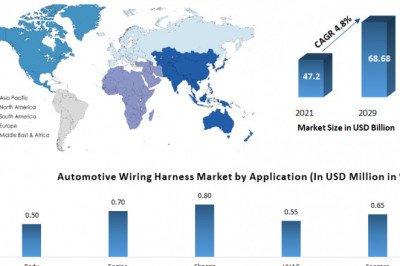
views
With the increasing awareness about sustainability and carbon footprints, organizations are changing the way of their communication. Environment and sustainability concerns are trendy topics in today’s world. Businesses worldwide are strategizing their communication flow and operations, keeping in mind its effects on the environment. Thankfully, organizations can improve their sustainability goal by going paperless and digitalizing the communication channels and processes. Digital communication makes a significant contribution to reducing an organization’s carbon footprint. Read through the article to know how you can increase a company’s sustainability management by going digital.
EDI & Environmental Impact
EDI is being used to send documents across the B2B and B2G channels. Using EDI is cheaper and more efficient than paper documents, but it is also quicker and environmentally friendly. Going digital makes a significant impact on improving sustainability. Further in the article, we will know how the consumption of paper is a major cause of deforestation and affects the environment negatively.
Paper Consumption Leads to Deforestation
According to a recent study, every fifth tree is chopped for manufacturing paper. Trees being cut down to make paper is not slowing down, escalating the drop in forested areas. As per the FAO reports, forestry experts stated the deforestation of 10 million hectares is highly unacceptable, and it is equal to the size of 35 football grounds that we are losing to deforestation.
In 2015, around 3040 billion trees were growing on the planet, meaning 204 trees per head. But, this number is dropping by 10 million every year. Research says that humankind has reduced the number of trees originally by half. This leads to drastic climate change, with a higher global warming rate. And the majority of this is caused by global paper consumption.
Verband Deutscher Papierfabriken conducted research (in 2017-2018) on the highest paper and cardboard consuming countries. Results showed, India, China, and Germany were the top countries in paper consumption, where India used 20% less paper as a whole than Germany despite having 16 times larger population. Finland consumes just 5.3% of Germany’s consumption, although its population of 5.5 million.
In a publication by the German Environment Agency, the Umweltbundesamt stated that around 40kgs of paper per person was being used for essential communication, education, and hygiene needs. Out of the global population, 64% have an average consumption of 20kg per year for their needs, while 14% use more than 125kg, i.e., average German citizen uses twice. The 14% are the cause of the global paper shortage. More than half paper produced is used for routine needs of printing and office supplies. While in Austria and Germany, online shopping has led 40% of all paper produced to go to packaging.
Go Digital- Reduce Paper Consumption and Support Sustainability
Businesses are responsible for a large share of the world’s annual paper usage. Companies consume around one metric tonne of paper, which requires an equal amount of energy to manufacture the paper. In simpler terms, companies need to go paperless to support sustainability and should aim for digital operations. One of the simplest ways to shift digital is by transforming the paper trail in B2B and B2G communication into the structured digital framework. HubBroker has been offering our EDI and API solutions to help organizations achieve that.
Using paper-based administration consumes a lot of time and unnecessary amounts of resources. Also, it requires transportation and processing, which also increases your costs. Paper-based administration is responsible for CO2 emission and affects the environment adversely. Using digital and machine-based readable files includes structured data, by comparison, responsible for carbon emission of 53g, almost half the value. Looking at the current calculations, one needs to grow several hectares of woodland annually to compensate for the level of CO2.
Improve Sustainability Via Business
To guarantee that organizations are not simply offering empty talk to sustainability and environmental-friendly behavior, they should be made mindful of the degree to which their activities impact society and the climate. Sustainability management implies limiting your adverse consequence on society and the environment while uplifting a positive effect. Setting up measures to support ecological and social sustainability often drives natural (long haul) economic sustainability. Examples could include
-
streamlining business processes
-
streamlining energy utilization (e.g. LED lighting, using a cloud)
-
reducing paper and packaging (digital documents instead of printouts)
-
improving corporate transparency
-
working on corporate straightforwardness
-
diminishing CO2 emission
-
archiving and imparting sustainability measures
Taking into account what we presently think about environmental change, it is about time that actions followed words. The requirement for sustainability is more intense than any other time. And this is not just because of the threat of further destroying our environment or the increase in environmental catastrophes worldwide.
Organizations are likewise being kept under pressure by
-
laws and guidelines, including EU order 2014/95/EU (CSR)
-
clients and investors who are requesting sustainability measures.
-
Organizations disregard these voices at their own risk.
Nowadays, it’s essentially insufficient to consider benefits while doing business together. You have an obligation also to consider sustainability, conservation, and your impact on the world around you.
Adopting EDI with HubBroker is an excellent first step towards developing business practices that value long-term sustainability as a critical metric for success. Connect with us today, and let us help reduce your business’s carbon footprint.












Comments
0 comment